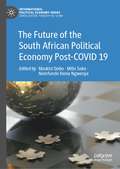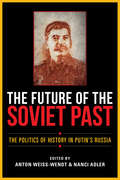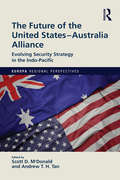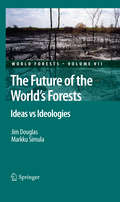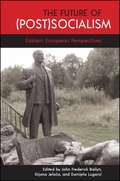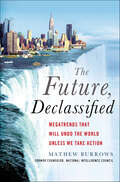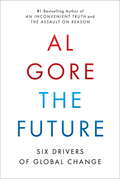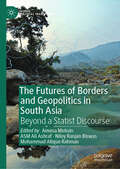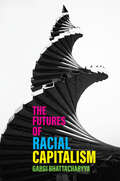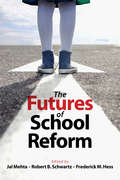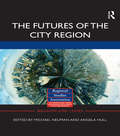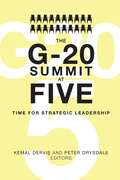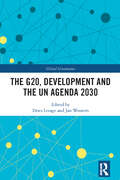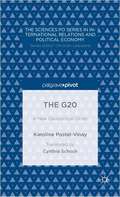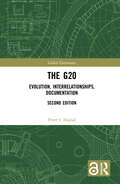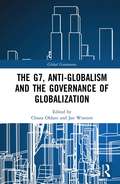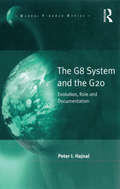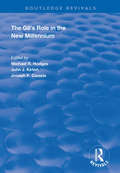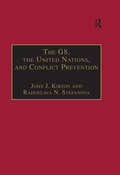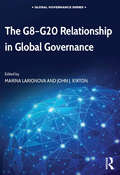- Table View
- List View
The Future of the Self (The FUTURES Series)
by Joanna NadinExploring the changing nature of &‘self&’ through the lens of popular culture and how changes in science, philosophy, technology, and society might impact our sense of self in the future.Look in the mirror – what do you see?We all feel, instinctively, that self exists. That somewhere inside us, under the clothes, the make-up, and self-tan, lurks a hard &‘pearl&’, a kernel of truth called &‘me&’. And it&’s big business uncovering that &‘authentic&’ kernel. It&’s also a fool&’s errand, because that &‘true self&’? It doesn&’t exist.Self is no more than a story we tell ourselves. It&’s mutable, pliable as Plasticine. Worse, it&’s not even strictly autobiographical, but co-authored with those around us. And as such, there is no one version, but myriad, and the number is growing as we are exposed to ever more connections.We are already seeing the effects travel, television, and celebrity culture can have on the formation of self, but as digital and social media exposure grows, and in the advent of AI, what will happen to our sense of self? Can we become ever more multiple and adapt better to our globalised world? Or will we dissolve into narcissitic, detached &‘nobodies&’?The Future of the Self will explore our current understanding of self in both philosophical and neuroscientific terms and through the lens of popular culture. It will ask what might happen to it in the coming years, and what a &‘useful self&’ might look like in the future.
The Future of the South African Political Economy Post-COVID 19 (International Political Economy Series)
by Mzukisi Qobo Mills Soko Nomfundo Xenia NgwenyaThis book examines the COVID-19 pandemic through socioeconomic lens that draw on history, approaches to state-market relations, and public policy perspectives In 2020, the world experienced the worst pandemic since the outbreak of the Spanish Flu of 1918, which continues to have far[1]reaching implications for the global economy and triggered macro-economic dislocations that severely affected the most vulnerable countries and segments of society. This book was conceived as a response to the disruptive shifts induced by the pandemic, with a particular focus on South Africa. International experience has shown that countries and societies that have gone through tough economic times, either as a consequence of wars or economic depressions, have responded to crises by enacting unpopular policy measures based on difficult tradeoffs, which often made way for innovation. The authors outline policy responses to the COVID-19 crisis and propose several interventions to mitigate its effects. These include developing innovative approaches to fiscal and monetary policies, labour market policies, industrial policies, as well as social policies. Building state capabilities, improving the governance and performance of state institutions, and managing digital change are some of the clear policy interventions that are laid out in this book.
The Future of the Soviet Past: The Politics of History in Putin's Russia
by Steven A. Barnes Stephen M. Norris Boris Noordenbos Nikolay Koposov George Soroka Kiril Feferman Johanna Dahlin Štěpán Černoušek Ivan Kurilla Nikita PetrovIn post-Soviet Russia, there is a persistent trend to repress, control, or even co-opt national history. By reshaping memory to suit a politically convenient narrative, Russia has fashioned a good future out of a "bad past." While Putin's regime has acquired nearly complete control over interpretations of the past, The Future of the Soviet Past reveals that Russia's inability to fully rewrite its Soviet history plays an essential part in its current political agenda. Diverse contributors consider the many ways in which public narrative shapes Russian culture—from cinema, television, and music to museums, legislature, and education—as well as how patriotism reflected in these forms of culture implies a casual acceptance of the valorization of Stalin and his role in World War II. The Future of the Soviet Past provides effective and nuanced examples of how Russia has reimagined its Soviet history as well as how that past still influences Russia's policymaking.
The Future of the United States-Australia Alliance: Evolving Security Strategy in the Indo-Pacific (Europa Regional Perspectives)
by Scott D. McDonaldThe United States-Australia alliance has been an important component of the US-led system of alliances that has underpinned regional security in the Indo-Pacific since 1945. However, recent geostrategic developments, in particular the rise of the People’s Republic of China, have posed significant challenges to this US-led regional order. In turn, the growing strategic competition between these two great powers has generated challenges to the longstanding US-Australia alliance. Both the US and Australia are confronting a changing strategic environment, and, as a result, the alliance needs to respond to the challenges that they face. The US needs to understand the challenges and risks to this vital relationship, which is growing in importance, and take steps to manage it. On its part, Australia must clearly identify its core common interests with the US and start exploring what more it needs to do to attain its stated policy preferences. This book consists of chapters exploring US and Australian perspectives of the Indo-Pacific, the evolution of Australia-US strategic and defence cooperation, and the future of the relationship. Written by a joint US-Australia team, the volume is aimed at academics, analysts, students, and the security and business communities.
The Future of the World's Forests: Ideas vs Ideologies
by Markku Simula Jim DouglasAt the landmark 1992 United Nations Conference on Environment and Development (Earth Summit), solemn resolutions were made both to protect the world's biodiversity and to co-operate on managing natural forests in a sustainable and ecologically responsible way. If anything, given recent developments in issues such as climate change and poverty, the problem of protecting and sustaining forests should logically have become more important globally. Yet public interest in, and development support for, forest activities have declined and rates of forest loss remain stubbornly high. Why has this happened? This book seeks answers to this question. It examines the often dysfunctional relationships between various members of the international forest constituency, which have so often prevented the formation of consensus. It also explores the tendency to pursue technical and politically convenient 'fixes' focused on the internal workings of the forest sector, while ignoring the overwhelming influence of external forces on the fate of forests. The result, all too often, has been programs which benefit a few powerful players and fail to provide real solutions. The book provides a new examination of and perspective on the international forest policy debate. It clarifies the reasons for global forest conflicts and provides insight for future policy development. Including examples from both the developed and developing world, it provides an invaluable resource for researchers and graduate students in forest policy and international relations, as well as a useful reference for policymakers and professionals in the forest sector, the development community and conservationists. With significant global attention now focused on reducing carbon emissions from deforestation and forest degradation (REDD), the authors examine the promise and the potential problems that apply to this initiative.
The Future of: Eastern European Perspectives (SUNY series, Pangaea II: Global/Local Studies)
by John Frederick Bailyn; Dijana Jelaca; Danijela LugaricIf socialism did not end as abruptly as is sometimes perceived, what remnants of it linger today and will continue to linger? Moreover, if postsocialism is an umbrella term for the uncertain times of various transitions that followed in socialism's wake, how might the "post" be rendered complicated by the notion that the unfinished business of socialism continues to influence the trajectory of the future? The Future of (Post)Socialism examines this unfinished business through various disciplinary and transdisciplinary approaches that seek to illuminate the postsocialist future as a cultural and social fact. Drawn from the fields of history, ethnology, anthropology, sociology, economics, political science, education, linguistics, literature, and cultural studies, contributors analyze various cultural forms and practices of the formerly socialist cultural spaces of Eastern Europe. In so doing, they question the teleology of linear transitional narratives and of assumptions about postsocialist linear progress, concluding that things operate more as continued interruptions of a perpetually liminal state rather than as neat endings and new beginnings.
The Future, Declassified: Megatrends That Will Undo the World Unless We Take Action
by Mathew BurrowsTwenty-five years ago when Mathew Burrows went to work for the CIA as an intelligence analyst, the world seemed frozen. Then came the fall of the Berlin Wall and the implosion of the Soviet Union; suddenly, unpredictability became a universal theme and foresight was critical. For the past decade, Burrows has overseen the creation of the Global Trends report—the key futurist guide for the White House, Departments of State and Defense, and Homeland Security. Global Trends has a history of making bold predictions and being right:* In 2004, it argued that al-Qaeda's centralized operations would dissolve and be replaced by groups, cells, and individuals—the very model of the 2012 Boston bombings.* In 2008, it included a scenario dubbed October Surprise, imagining a devastating late-season hurricane hitting an unprepared New York City.In The Future, Declassified, Burrows—for the first time—has expanded the most recent Global Trends report into a full-length narrative, forecasting the tectonic shifts that will drive us to 2030. A staggering amount of wholesale change is happening—from unprecedented and widespread aging to rampant urbanization and growth in a global middle class to an eastward shift in economic power and a growing number of disruptive technologies. Even our physical geography is changing as sea levels rise and faster commercial shipping routes open up through a warming Arctic region.The book concludes with its most provocative section: four fictional paths to 2030 with imagined storylines and characters based on analysis by the most authoritative figures in the intelligence community. As Burrows argues, we are living through some of the greatest and most momentous developments in history. Either we take charge and direct those or we are at their mercy. The stakes are particularly high for America's standing in the world and for ordinary Americans who want to maintain their quality of life. Running the gamut from scary to reassuring, this riveting book is essential reading.
The Future: Six Drivers of Global Change
by Al GoreFrom the former vice president and #1 New York Times bestselling author comes An Inconvenient Truth for everything--a frank and clear-eyed assessment of six critical drivers of global change in the decades to come. Ours is a time of revolutionary change that has no precedent in history. With the same passion he brought to the challenge of climate change, and with his decades of experience on the front lines of global policy, Al Gore surveys our planet's beclouded horizon and offers a sober, learned, and ultimately hopeful forecast in the visionary tradition of Alvin Toffler's Future Shock and John Naisbitt's Megatrends. In The Future, Gore identifies the emerging forces that are reshaping our world: * Ever-increasing economic globalization has led to the emergence of what he labels "Earth Inc."--an integrated holistic entity with a new and different relationship to capital, labor, consumer markets, and national governments than in the past. * The worldwide digital communications, Internet, and computer revolutions have led to the emergence of "the Global Mind," which links the thoughts and feelings of billions of people and connects intelligent machines, robots, ubiquitous sensors, and databases. * The balance of global political, economic, and military power is shifting more profoundly than at any time in the last five hundred years--from a U.S.-centered system to one with multiple emerging centers of power, from nation-states to private actors, and from political systems to markets. * A deeply flawed economic compass is leading us to unsustainable growth in consumption, pollution flows, and depletion of the planet's strategic resources of topsoil, freshwater, and living species. * Genomic, biotechnology, neuroscience, and life sciences revolutions are radically transforming the fields of medicine, agriculture, and molecular science--and are putting control of evolution in human hands. * There has been a radical disruption of the relationship between human beings and the earth's ecosystems, along with the beginning of a revolutionary transformation of energy systems, agriculture, transportation, and construction worldwide. From his earliest days in public life, Al Gore has been warning us of the promise and peril of emergent truths--no matter how "inconvenient" they may seem to be. As absorbing as it is visionary, The Future is a map of the world to come, from a man who has looked ahead before and been proven all too right.
The Futures of Borders and Geopolitics in South Asia: Beyond a Statist Discourse (Global Political Transitions)
by Amena Mohsin Asm Ali Ashraf Niloy Ranjan Biswas Mohammad Atique RahmanThis book offers a theory-driven and evidence-based approach to the study of South Asian borders and geopolitics. In the book, readers will be particularly interested to see the multiple meanings of borders and territoriality and their effects on border communities. The analyses found within chapters show how the statist and territorialist definitions of border and geopolitics have given way to the rise of liberal, humane, and gendered definitions of borders and geopolitics. Individual chapters in this volume employ a wide variety of qualitative research methods, with some adopting a mixed method approach by combining quantitative and qualitative data. The book would be a useful reference to academics and practitioners with a regional interest in South Asia.
The Futures of Racial Capitalism
by Gargi BhattacharyyaCapitalism appears to be endlessly in crisis but without ever loosening its hold on our lives. New modes of racism and exclusion emerge, but the old ones never go away. We continue to struggle to live and survive in its wake but are unable, still now, to build commonality with each other. In this incisive book, Gargi Bhattacharyya revisits debates about racial capitalism and its violence through differentiation. Taking the four lenses of prisons, borders, debt and platforms, Bhattacharyya reveals how this moment of capitalist crisis positions humans as expendable, but differentially so, in a process that remakes longstanding racialized hierarchies. Uncovering practices and techniques embedded in the shifting processes of accumulation and state power, the chapters illuminate how value is extracted from populations through non-wage routes and indebtedness. This engaging introduction to racial capitalism offers an interlocking and insightful analysis of capitalist renewal, essential for students and scholars interested in issues of race, racism and inequality.
The Futures of School Reform
by Jal Mehta Frederick M. Hess Robert B. SchwartzThe Futures of School Reform represents the culminating work of a three-year discussion among national education leaders convened by the Harvard Graduate School of Education. Based on the recognition that current education reform efforts have reached their limits, the volume maps out a variety of bold visions that push the boundaries of our current thinking. Taken together, these visions identify the leverage points for generating dramatic change and highlight critical trade-offs among different courses of action. The goal of this book is not to present a menu of options. Rather, it is to surface contrasting assumptions, tensions, constraints, and opportunities, so that together we can better understand--and act on--the choices that lie before us.
The Futures of School Reform
by Jal MehtaThe Futures of School Reform represents the culminating work of a three-year discussion among national education leaders convened by the Harvard Graduate School of Education. Based on the recognition that current education reform efforts have reached their limits, the volume maps out a variety of bold visions that push the boundaries of our current thinking. Taken together, these visions identify the leverage points for generating dramatic change and highlight critical trade-offs among different courses of action. The goal of this book is not to present a menu of options. Rather, it is to surface contrasting assumptions, tensions, constraints, and opportunities, so that together we can better understand—and act on—the choices that lie before us.
The Futures of the City Region: Futures Of The City Region (Regions and Cities)
by Angela Hull Michael NeumanDoes the ‘city region’ constitute a new departure in urbanisation? If so, what are the key elements of that departure? The realities of the urban in the 21st century are increasingly complex and polychromatic. The rise of global networks enabled by supranational administrations, both governmental and corporate, strongly influences and structures the management of urban life. How we conceive the city region has intellectual and practical consequences. First, in helping us grasp rapidly changing realities; and second in facilitating the flow of resources, ideas and learning to enhance the quality of life of citizens. Two themes interweave through this collection, within this broad palette. First are the socio-spatial constructs and their relationship to the empirical evidence of change in the physical and functional aspects of urban form. Second is what they mean for the spatial scales of governance. This latter theme explores territorially based understandings of intervention and the changing set of political concerns in selected case studies. In efforts to address these issues and improve upon knowledge, this collection brings together international scholars building new data-driven, cross-disciplinary theories to create new images of the city region that may prove to supplement if not supplant old ones. The book illustrates the dialectical interplay of theory and fact, time and space, and spatial and institutional which expands on our intellectual grasp of the theoretical debates on ‘city-regions’ through ‘practical knowing’, citing examples from Europe, the United States, Australasia, and beyond. This book was originally published as a Special Issue of Regional Studies.
The Futurica Trilogy
by Alexander Bard Jan SöderqvistIn the late 1990's, Swedish social theorists Alexander Bard and Jan Söderqvist started working on a radical new theory, since referred to as The Netocracy Hypothesis. At this early stage Bard & Söderqvist foresaw that the control of the internet would be the subject of the main power struggle for the next century.
The G-20 Summit at Five
by Kemal Dervis Peter DrysdaleCan the G-20 become a steering committee for the world's economy? Launched at a moment of panic triggered by the financial crisis in late 2008, the leaders' level G-20 is trying to evolve from crisis committee for the world economy to a real steering group facilitating international economic cooperation.What can and should such a "steering committee" focus on? How important could the concrete gains from cooperation be? How much faster could world growth be? Is there sufficient legitimacy in the G-20 process? How does the G-20 relate to the IMF and the World Bank? How can Australia in 2015, and then Turkey in 2016, chair the process so as to encourage strategic leadership?The East Asian Bureau of Economic Research in the Crawford School of Public Policy at the Australian National University and the Global Economy and Development program at the Brookings Institution joined forces in putting together this volume and asked opinion leaders and policymakers from G-20 countries to provide their independent perspectives.Contributors include Colin Bradford (Brookings), Peter Drysdale (Australian National University), Kemal Dervis (Brookings), Andrew Elek (Australian National University), Ross Garnaut (University of Melbourne), Huang Yiping (China Center for Economic Research), Bruce Jones (Brookings), Muneesh Kapur (IMF), Homi Kharas (Brookings), Wonhyuk Lim (Korea Development Institute), Rakesh Mohan (IMF), David Nellor (consultant, Indonesia), Yoshio Okubo (Japan Securities Dealers Association), Mari Pangestu (Republic of Indonesia), Changyong Rhee (former Asian Development Bank), Alok Sheel (Government of India), Mahendra Siregar (Republic of Indonesia), Paola Subacchi (Chatham House, London), Carlos Vegh (Brookings), Guillermo Vuletin (Brookings), and Maria Monica Wihardja (World Bank).
The G-20 Summit at Five
by Kemal Dervis Peter DrysdaleCan the G-20 become a steering committee for the world's economy? Launched at a moment of panic triggered by the financial crisis in late 2008, the leaders' level G-20 is trying to evolve from crisis committee for the world economy to a real steering group facilitating international economic cooperation.What can and should such a "steering committee" focus on? How important could the concrete gains from cooperation be? How much faster could world growth be? Is there sufficient legitimacy in the G-20 process? How does the G-20 relate to the IMF and the World Bank? How can Australia in 2015, and then Turkey in 2016, chair the process so as to encourage strategic leadership?The East Asian Bureau of Economic Research in the Crawford School of Public Policy at the Australian National University and the Global Economy and Development program at the Brookings Institution joined forces in putting together this volume and asked opinion leaders and policymakers from G-20 countries to provide their independent perspectives.Contributors include Colin Bradford (Brookings), Peter Drysdale (Australian National University), Kemal Dervis (Brookings), Andrew Elek (Australian National University), Ross Garnaut (University of Melbourne), Huang Yiping (China Center for Economic Research), Bruce Jones (Brookings), Muneesh Kapur (IMF), Homi Kharas (Brookings), Wonhyuk Lim (Korea Development Institute), Rakesh Mohan (IMF), David Nellor (consultant, Indonesia), Yoshio Okubo (Japan Securities Dealers Association), Mari Pangestu (Republic of Indonesia), Changyong Rhee (former Asian Development Bank), Alok Sheel (Government of India), Mahendra Siregar (Republic of Indonesia), Paola Subacchi (Chatham House, London), Carlos Vegh (Brookings), Guillermo Vuletin (Brookings), and Maria Monica Wihardja (World Bank).
The G20, Development and the UN Agenda 2030 (Global Governance)
by Jan Wouters Dries LesageThis book offers a unique assessment of the G20’s development agenda and its potential to be an impactful actor in the global architecture of development cooperation. Representing two-thirds of the world population, 85 percent of economic output, 75 percent of global trade, and 80 percent of carbon dioxide emissions, the G20 embodies an overwhelming concentration of economic and political power, enhanced through regular meetings of heads of state and government. This position allows it the opportunity to play a significant role in ongoing multilateral policy processes, but also to further undermine universal development governance at the UN, already challenged by the Bretton Woods institutions, OECD and G8. Providing context and a history of the G20’s involvement in development governance, expert international contributors consider the outcome of major conferences, the perspectives of China, India, and the EU, the shift away from positions held by Western countries and the role of civil society. They also offer in-depth analysis of the G20’s engagement with issues concerning infrastructure, food and agriculture, taxation, macro-economic policy and the Sustainable Development Goals. The book will be of interest to scholars and students of development, international organisations and global governance.
The G20: A New Geopolitical Order
by Karoline Postel-VinayThis book argues that the G20 is neither a global executive board for a new world order, nor is it just a crisis unit for failing economies. It is a laboratory for the observation, experimentation and invention of new forms of international cooperation that are redefining global politics.
The G20: Evolution, Interrelationships, Documentation (Global Governance)
by Peter I. HajnalThis revised and updated edition presents detailed analysis of the history and current state of the G20, and the challenges it faces. The emergence of the G20 was the result of calls for full inclusion of major developing and other systemically important countries and to reflect new global economic and political realities. The growth of Chinese power, growing significance of other major developing countries and new concerns concerning anti-globalization and rising protectionism in the West have all resulted in important changes to the dynamics of the institution. The suspension of Russia’s membership in the G8 has also necessitated a change in G7/G20 dynamics and the G20’s processes, agenda priorities and role in global governance. Providing a historical overview and analysis of the evolving agenda, methods of performance evaluation, relationship with structured international organizations and other external actors, Hajnal’s text is an authoritative work of history, analysis and reference on the G20 and also G7/G8/G20 reform. This book is an essential source for researchers and students focusing on the G20, international organizations and global governance, and more generally for scholars in the fields of political science, economics, and finance.
The G7, Anti-Globalism and the Governance of Globalization (Global Governance)
by Jan Wouters Chiara OldaniThe G7, a self-selected club of like-minded industrialized countries, looks at first glance ill-suited to address current anti-globalist concerns. Despite this, it has successfully confronted anti-globalization, populist and protectionist pressures by focussing on concerns surrounding the destruction of the natural environment, immigration, transnational crime, drugs, disease and terrorism, thus demonstrating the social and ecological advantages that globalization brings. Exploring how the world’s oldest informal summit institution continues to respond to rising anti-globalisation, populism and protectionism, this book investigates the contribution the G7 makes to global governance through its actions and accountability of its members. The expert contributors analyse from different perspectives the issues that have contributed to the rise of populism and protectionism, and how well the G7 has responded to them. Each contribution identifies avenues that might allow renewing and strengthening the role of the G7 in times of global change, with a view of strengthening its legitimacy and effectiveness. It will be of interest to policy makers, diplomats, scholars of international relations, international political economy, diplomacy, summitry and global governance. The issues discussed will also be particularly relevant to those working for civil society and non-governmental organizations seeking to participate in governance forums or to influence those who do.
The G7/G8 System: Evolution, Role and Documentation (Routledge Revivals)
by Peter I HajnalFirst published in 1999, this guide to the G7/G8 system discusses the origins, characteristics, role and agenda of the G7/G8 system; reviews its evolution; surveys the major debates and questions about the G7/G8; and provides a detailed study of its complex and elusive documentation. It also includes a comprehensive bibliography, of the G7/G8 and its concerns, listing over 600 books, shorter writings, publications in series, book chapters, articles in periodicals, government publications, international organisation publications and Internet resources. The book is intended as a contribution to scholarly literature and as a useful work of reference for academics, government officials, the media, libraries and the general public.
The G8 System and the G20: Evolution, Role and Documentation (Global Finance)
by Peter I. HajnalThe Group of Eight has become a central actor in global governance with a steadily expanding role and agenda. The leaders' summits remain at the apex of the G8 system, but the leaders' work is complemented by intensifying and expanding networks of ministerial fora as well as various task forces and expert groups. Some of these entities, initially launched by the leaders, have taken on a life of their own with an agenda that diverges from the main concerns of the summits. Following on from Hajnal's acclaimed book The G7/G8 System, this volume discusses the origins, characteristics, evolution, role and agenda of the G7 and G8 system, including a systematic survey of its components. It introduces the major debates about the G7 and G8, looks at proposals to reform the G8-G20 and provides a detailed study of the complex, elusive and changing patterns of documentation of the broader G8-G20 system, including electronic information.
The G8's Role in the New Millennium (Routledge Revivals)
by Joseph P. Daniels John J. Kirton Michael R. HodgesFirst published in 1999, this collection combines the talents of leading scholars and analysts of the G7/G8 from several disciplines and regions. It is the product of two conferences: Explaining G8 Effectiveness and Jobs, Crime, Money: Challenges for the G8 in 1998. The contributors are all senior figures from the three global regions represented in the G8: Europe, North America and Japan. The inclusion among the editors and authors of those with widely varying views on the G8 and from differing disciplinary perspectives ensures that this work will present a poignant and productive debate rather than a strained consensus.
The G8, the United Nations, and Conflict Prevention (The G8 and Global Governance Series)
by Radoslava N. StefanovaThis innovative and forward looking work examines the Genoa summit agenda with a view to strengthening international conflict prevention institutions and identifying and analyzing economic early warning indicators. It devotes particular attention to the Italian contribution and approach and the ways in which it can be effectively implemented following the summit. The first book to compare the role of the G8 and the United Nations in conflict prevention and human security, The G8, the United Nations, and Conflict Prevention will be essential reading for academics, government officials and members of the business and media communities.
The G8-G20 Relationship in Global Governance (Global Governance)
by Marina Larionova John J. KirtonIf the growing demand for global governance breathed new life into the established G7/8 and the more recent G20, it raised questions about the evolving and optimal relationship between them. One answer arose from the G20’s third summit, when it proclaimed the G20 would govern global finance and economics, while the old G8 would focus on development and security. Yet this rough division of labour did not address which issues lay within each category and how interconnections would be addressed to create comprehensive, coherent global governance for a complex world. This volume considers these questions. It explores the summits’ performance, the division of labour during their coexistence, their comparative strengths and limitations, and how the future partnership could be improved to benefit the global community. The authors explain the recent evolution and performance of the G8 and G20 summits and their evolving empirical relationship. They consider the G8/G20 relationship with other actors engaged in global governance, notably the major multilateral organizations and civil society. They assess G7/8 and G20 effectiveness and accountability. And they identify, based on this empirical and analytical foundation, how the relationship can be improved for today’s tightly wired world.

